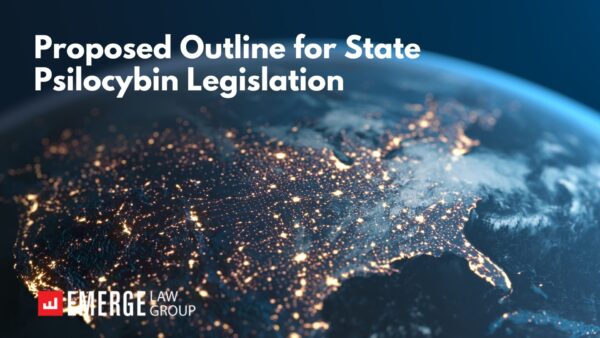PsychedeLinks is a curated selection of top news stories impacting business, research, and culture in the psychedelics ecosystem, crafted by Emerge Law Group’s groundbreaking Psychedelics Group.
Emerge’s Hot Take
DEA Proposes New Telemedicine Regulations
The Ryan Haight Online Pharmacy Consumer Protection Act of 2008 (the Act) amended the Controlled Substances Act (CSA) in an attempt to prevent the illegal distribution of controlled substances on the internet. Among other things, the Act required an in-person medical evaluation as a prerequisite to prescribing or otherwise dispensing controlled substances online. One exception allowed DEA to waive the in-person requirement during the COVID Public Health Emergency (PHE). During the pandemic a number of companies began providing a not insignificant volume of controlled substances via telehealth, namely ketamine and Adderall, subject to this exception. However, that exception is set to expire on May 11, 2023, thrusting a nascent industry into uncertainty over the past few months. Analysts familiar with DEA’s intransigence and stall tactics predicted that the ketamine telehealth industry would be devastated by the expiration of the PHE declaration. In a surprise to most, on March 1, 2023, DEA issued a notice of rulemaking that would authorize telemedicine where 1) the prescribing practitioner has not conducted an in-person medical evaluation with the patient; 2) the prescription was issued pursuant to a telemedicine encounter and 3) the telemedicine encounter results in a prescription for controlled medications. There are some limitations, including that prescribing practitioners will only be able to issue telehealth prescriptions for up to a 30-day supply of a controlled substance, and there are labeling and recordkeeping requirements. Some telehealth providers and advocates have concerns about some of the limitations in the DEA’s proposed rules, but for ketamine in general, “this is an encouraging development from an agency that has earned a reputation for being dilatory and obstructionist at times”, says Emerge Of Counsel attorney, Matt Brockmeier.
Other Noteworthy News
Bill Seeks Personal Data Collection On People Who Use Legal Psilocybin in Oregon
“State Sen. Elizabeth Steiner, D-Portland, wants the state to monitor whether Oregon’s landmark law allowing the controlled use of psilocybin is working as intended — and not just for ‘rich white people.’ The Oregon Senate Health Committee on Monday heard her bill, Senate Bill 303, which would require psilocybin service centers to collect data on the health, education, race, income and other sensitive information of adults that use the hallucinogenic drug under their supervision. Steiner’s bill is in response to concerns that Oregon’s psilocybin program will only be accessible to those who can afford what could be hefty price tags service centers charge. It’s also meant to answer questions about the effectiveness of the first-of-its-kind program, which was pitched to voters as a means to address mental health and included a requirement that a report be issued on safety and efficacy after the first two years. Opponents of the bill argue it will mean another administrative burden that will further drive up the cost of psilocybin sessions. They also say its data collection requirement will have a chilling effect on people who may already be wary of using the federally illegal drug for its purported benefits.”
New Mexico Lawmakers Approve Psilocybin Study Bill
“New Mexico lawmakers advanced legislation on Wednesday to create a state body that would study the possibility of launching a psilocybin therapy program for patients with certain mental health conditions who could benefit from using the psychedelic. The House Health and Human Services approved the bill, sponsored by Rep. Christine Trujillo (D), in a unanimous voice vote. The measure now heads to the House Appropriations & Finance Committee. The legislation would establish an eight-member Psilocybin Advisory Group appointed by the governor that would be responsible for studying and making recommendations on the ‘feasibility’ of creating a psilocybin therapy program. Members would specifically need to consider policies to create a regulatory framework for psilocybin cultivation, manufacturing and dispensing, as well as ‘treatment guidelines for the use of psilocybin-derived products to treat certain mental health issues, including patient selection and provider training and certification.’”
More and More Psychedelic Reform Bills in the Pipeline Throughout United States
“2023 has already shown extensive advances in the realm of psychedelic policy reform. About a dozen states in the US have put forward legislation that would see multiple psychedelic substances from ketamine, MDMA, psilocybin, and more receive downgraded criminalization designations. In addition, lawmakers are as open as ever to the idea of psychedelics’ therapeutic potential. Special task forces or state-sponsored research bodies have been created or are set to be voted on which would seek to properly educate voters and state governing bodies on the possibilities associated with psychedelic therapy. With direct support from the Governor’s office, two new psychedelic research bills have been unanimously approved by Hawaii’s Senate Ways & Means Committee. While not exactly psychedelic policy, an important bill is brewing in Colorado’s state legislature. It would allow cities throughout the state to institute “overdose prevention centers”, similar to those seen in Europe, where citizens could use drugs regardless of their legality in a medically supervised environment.”
Untangling Anorexia: Psychedelics Offer Hope for a Neglected Condition
“Characterised by self-starvation, anorexia nervosa is a psychiatric disorder that mainly affects adolescent women, who become invested in restricting their food intake. A fear of weight gain can morph into a general fear of loss of control. In the past, clinicians have looked to pharmaceuticals for help, but several antidepressants, antipsychotics and nutritional or hormonal supplements have failed in clinical trials[4]. As a result, no medicine has been licensed. Another approach attempts to reset the outlook of a person with anorexia nervosa with psychedelics. Several clinical trials of psilocybin — the active ingredient in magic mushrooms — are underway. ‘If you experience that you can still have life, that you can still have hope, this helps to motivate the patient for further therapy,’ says Hubertus Himmerich, a clinician and researcher at King’s College London, who is leading a trial of psilocybin for anorexia, using ‘COMP360’ tablets of synthesized psilocybin manufactured by COMPASS Pathways. Two other trials of psilocybin therapy for anorexia nervosa are also ongoing.”
Subscribe
Subscribe to PsychedeLinks to receive essential biweekly articles on news, business, and culture in the psychedelics industry, delivered straight to your inbox.




